Is it Safe for Pet Beardies to Have Apple? As the age-old saying goes – “An…
Can Bearded Dragons Eat Blueberries
Is it Safe for Pet Beardies to Have Blueberry?
For any bearded dragon owner, it is always important to mix things up and keep their nutritional diet interesting.
These fascinating little dragons are great pets to have, play with, and even talk to from time to time. And since these l’ll critters like feeding on live insects, you should also include meat foods and greens as a fair proportion of their diet.
But what else can you include in their health diet? Well, options galore. Like for starters, that container of delish blueberries is kept in your refrigerator!
So, speaking of blueberries- How safe is feeding blueberries to your pet bearded dragon?
Truth be told, bearded dragons like occasional treats –in which may also include delicious looking blueberries! These fruits are juice, sweet, soft, and your pet dragon would most likely gobble them up straight away!
In fact, respective field reptile specialists and vets state – blueberries, similar to apples, strawberries, and grapes, stand as among the safer fruits to feed to pet bearded dragons.
They even state that the nutritional content present in each of these fruits make up for an appreciative diet, which helps in their optimal growth and health.
But while you do it, you also need to keep at the back of your mind that these pet lizards are diet-sensitive creatures. Too much of anything may very well bring about unwanted health complications to them.
Experts believe that –Moderation is the key here. And for the safe their health, it is best to feed them blueberries (or other fruits for that matter) in small quantities once a week or twice a month!
(LET’S EXPLORE FURTHER) – On The Irrefutable Health Benefits of Feeding Blueberries In Moderation To Your Pet Bearded Dragon!
Generally speaking, bearded dragons relish blueberries. And provided they eat blueberries in appropriate moderation, this nutritional-fruit delivers some amazing health benefits for their proper growth and development.
Here’s uncovering certain health benefits of feeding blueberries to your pet bearded dragon!
- The fruit provides them the necessary antioxidants, which aid in boosting their health and reducing inflammation
- The fruit packs a good amount of carbohydrates, which deliver them the energy to function actively
- The fruit contains manganese, which helps in augmenting their overall metabolism and reducing their inflammation
- The fruit delivers a good dose of vitamin C, which helps in strengthening your pet dragon’s growth, immune system, and reproductive abilities
- Blueberries also contain Vitamin K1, which aids in supporting quality heart and bone health. Plus, it also helps control blood clotting in your pet dragon
- What’s more, the fruit contains roughly 85% of water, which helps keeps your bearded dragon’s hydration levels intact
These undeniable health benefits are what make blueberries a good food choice for your pet dragon. And when feeding them, the best course of action should be to feed them occasionally in the form of a special treat combined with their usual nutritional diet!
(ON THE FLIP SIDE) – Regularly Feeding Blueberries to Your Bearded Dragon Can Also Bring About These Potential Health Complications
Before you include blueberries to your pet bearded dragon’s diet, you should also know that the fruit contains a high dose of phosphorus and a low concentration of calcium.
Most bearded dragons (as all pet reptiles) require an appropriate quantity of calcium to support their health, bones, and overall growth. But because the fruit contains more phosphorus and less calcium, field experts recommend feeding blueberries to a minimum.
Excessively feeding blueberries (unknowingly, of course) will lead to calcium deficiency, eventually leading to Metabolic Done Disease- a paralyzing condition that eventually leads to death. The presence of more phosphorus prevents the calcium from properly being absorbed by your pet dragon’s body and makes your l’ll dude prone to MBD!
Experts opine- the appropriate ratio for calcium and phosphorus to be 2:1. Plus, they suggest offering this fruit as a special one-off treat mixed with other nutritious greens. Doing so will prevent this common yet dreaded condition from engendering your pet beardie!
Besides this issue, blueberries also consist of high sugar content. And field experts state that sugar should most definitely be excluded from your pet dragon’s diet! By consuming excessive food having a high sugar dose, your pet dragon will start suffering from several health complications such as – diabetes, obesity, heart complications, and even an untimely death! What’s more, it can also lead to mouth infection or rotting, which resultantly will cause severe pain and inflammation for your pet beardie.
Notable vets further explain this cause due to their teeth structure. They state- unlike we humans, bearded dragons have their teeth directly fused to their jaw. And that makes them more prone to developing these mouth plagues over time!
These vets also point out – sugary foods can even make your bearded dragon lethargic. So keeping in mind each of these risky complications, you should look to feed blueberries in small quantities once or twice a month at the most! And if you are successfully able to maintain that over a period, then safe to say; your pet bearded dragon will be free from any such aforementioned ailments and growth healthily!
What About Feeding Frozen Blueberries To Your Pet Bearded Dragon?
Another relevant question which most owners want to know is – Can they feed frozen blueberries to their pet bearded dragon?
Over the course of time, there are some who hold the notion that frozen blueberries are more nutritional than fresh. While others have clearly stated to stick with fresh and organic blueberries for your pet bearded dragon!
Ideally, the wise choice would be to go with organic blueberries, preferable procured from a reliable supplier. However, feeding them, make sure you wash them properly to remove any trace of pesticides and chemicals on their surface. Then if the need be so, you can freeze those organic blueberries yourself and use them whenever you need to – be it for yourself or your doting pet dragon.
Another thing to keep in mind is– removing any uneaten fruit from your beardie’s sanctuary. This is because such half-eaten or uneaten fruits kept for a long time can rot quickly inside your pet dragon’s hot terrarium. So, keep it clean and mess-free at times!
How Experts Recommend Feeding Blueberries To Your Pet Bearded Dragon?
There are certain precautionary preparations that you need to adhere prior to feeding this delis fruit to your pet bearded dragon.
And here are those steps recommended by field experts!
- Always make it a point to check the quality of the procured blueberries. Refrain from taking those which either appear to have rotted or are on the verge of rotting. That can make your pet beardie sick or give rise to other health complications
- Prior to feeding them, wash it with clean water to remove any existing chemicals and pesticides from its exterior surface. Then cut them into small and easy to eat sizes. Also, remember to remove all seeds from the fruit before serving them their nutritional diet salad
- Since you will be using them as an occasional treat, the best course of action would be to use them as their diet salad topper. But do keep their main meal in the form of nutritional-filled greens and fresh vegetables. The same goes when you provide them meat food. Just add a few bits of blueberry to their dish and watch your doting pet dragon devour everything served up to them
That said, you must not feed them dried blueberries simply because the sugar content is more in them. Contrarily, you can feed them blueberry leaves (just a few) in moderation, of course.
Wrapping Up
Bearded dragons are known to feast on a plethora of fruits, vegetables, and insects. However, what’s most important in their case is controlled feeding. So, whenever you feed blueberries (or any fruit), ensure it is well inside 10% of their overall diet.
And if you suspect anything wrong with your pet beardie or some unusual behaviour resulting after eating a particular food, rush them to the nearest vet care for a full check-up and appropriate diagnosis.
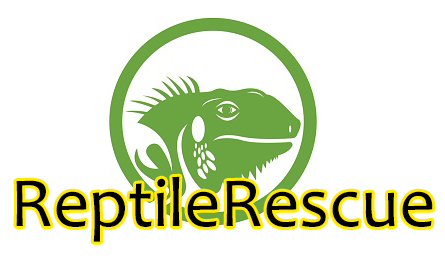
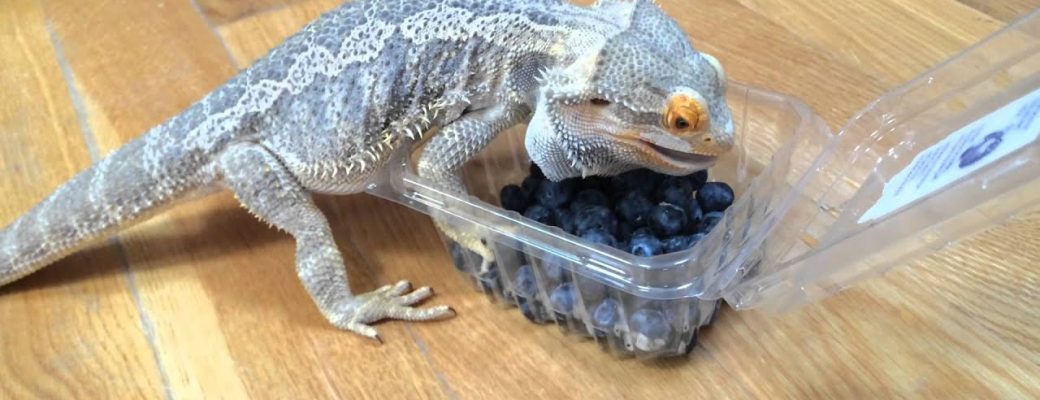
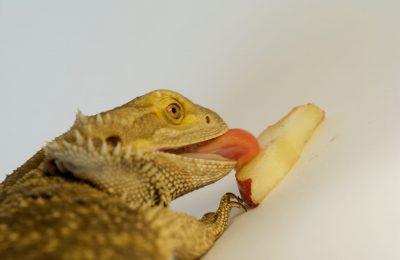
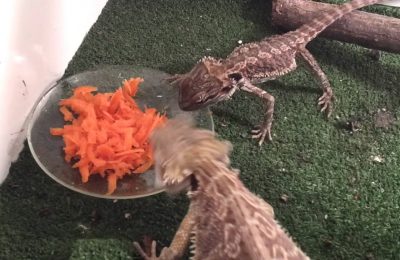
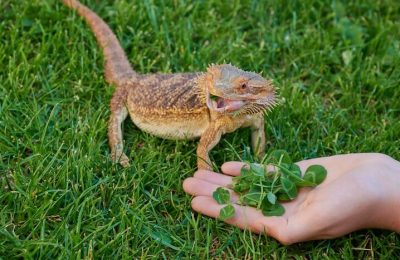
This Post Has 0 Comments